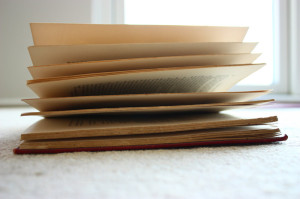 Writing can be therapeutic, lucrative, enjoyable…and sometimes a little maddening. Whether it’s something you do in your free time for pleasure or a craft you’re hoping to make a living from, writing is a skill that can be honed. As Stephen King puts it, “If you want to be a writer you must do two things above all others: read a lot and write a lot.” What better way to improve your writing than to read a book specifically about it?
Writing can be therapeutic, lucrative, enjoyable…and sometimes a little maddening. Whether it’s something you do in your free time for pleasure or a craft you’re hoping to make a living from, writing is a skill that can be honed. As Stephen King puts it, “If you want to be a writer you must do two things above all others: read a lot and write a lot.” What better way to improve your writing than to read a book specifically about it?
The Elements of Style by William Strunk Jr. and E.B. White
The quintessential writer’s handbook that nearly every well-known writer has turned to, or mentioned in an interview, at least once. A concise and timeless guide to writing, Strunk’s original text was created for his English students at Cornell as a no-nonsense blueprint to style, grammar, and all things writing. His former student E.B. White explains that it was meant to “cut the vast triangle of English rhetoric down to size and write its rules and principles on the head of a pin.” The book is a bit bigger than a pinhead, but not by much.
Available for free online or on Kindle and other devices. You can also check out the recently published illustrated edition with modernized examples and adorable drawings by Maira Kalman.
Zen in the Art of Writing by Ray Bradbury
This book takes your mind on a journey and gives you a dose of Bradbury’s enthusiasm for writing with nine essays on writing and creativity. While it does not provide straight-forward rules and writing regulations, Bradbury offers helpful “nuts and bolts” tips about writing regimens, routines, and other relevant advice. If you’re needing a dose of inspiration or wondering whether writing is for you, this is the book to grab.
The Forest for the Trees: An Editor’s Advice to Writers by Betsy Lerner
Who knows writers better than editors? Betsy Lerner’s no-nonsense book will have you saying, “That’s me!” within the first few pages. She has seen, heard, met, and read it all…from the ambivalent writer to the self promoter. In the first half of the book she identifies six types of writers, talks about their strengths and weaknesses, and offers guidance on how to be successful. Part two is dedicated to publishing—seeking agents, dealing with rejection, deciding on all of the details, and more. This will be a book you return to again and again for guidance and reassurance.
Reading Like a Writer by Francine Prose
Francine Prose believes that writers learned and continue to learn to write by reading the work of their predecessors and contemporaries. This book is a guided tour through the tools, tricks, and techniques of master writers like Kafka, Austen, Flannery O’Connor, George Eliot, and Dickens. She pays close attention to words, sentences, paragraphs, narration, character, dialogue, details, and gesture so you can learn to do so as well. Prose’s wisdom, passion, and humor throughout inspires the reader…and the writer.
On Writing: A Memoir of the Craft by Stephen King
Equal parts memoir and guide, this book is a bit like listening to your favorite professor or grandparent dispense their worldly and captivating advice. The story of King’s life weaves a history of observations, experiences, and writing successes and failures that are relatable and even a little self-deprecating (which the reader may need given his wealth and fame!) The second half of the book was written after King was inured in a terrible car accident and includes straight forward rules and advice on writing. If you only know Stephen King for his movies, this book will convince you to dive into one of his books…even if you hate horror (he’ll convince you of the merit in his chosen genre throughout the book as well!).
Here’s to reading to become better writers!

















